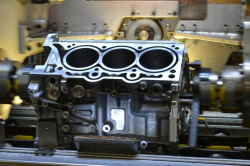— A Jeep Wrangler Pentastar engine lawsuit alleges the cylinder heads in the engines leave casting sand that builds up in the radiators and oil coolers, creating sludge in the systems and dashing the hopes of occupants to have heating and cooling.
The Jeep Wranglers are equipped with V6 3.6-liter Pentastar engines with cylinder heads made using a sand-casting method, while the engine blocks are created using die-casting.
The proposed Jeep Wrangler Pentastar lawsuit includes any consumers who purchased or leased a 2012-2017 Jeep Wrangler in the U.S.
Plaintiffs Jason Williams and James Jobe filed the Wrangler lawsuit alleging Chrysler refuses to honor the warranties of the Jeeps, which leaves the repair costs to owners and lessees for problems that FCA allegedly knew about since 2011.
The automaker allegedly tells Wrangler customers the sludge problems are caused by "external factors" and owners misusing the SUVs.
The plaintiffs believe Chrysler doesn't do enough to get rid of the sand from the cylinder heads of the Pentastar engines in the Wranglers, leaving the sand to seep out as the SUVs are driven. The sand allegedly settles in the heater cores, radiators and oil cooling systems where it forms the sludge that causes the heating and cooling systems to fail.
The plaintiffs say they didn't learn of the problems until after buying and driving the Wranglers because FCA concealed its knowledge of the reliability of the Pentastar engines.
Jason Williams says he purchased a 2012 Jeep Wrangler in May 2013, but with about 9,000 miles on the odometer, he says the Jeep was having heater problems and emitting only warm air from one side of the Wrangler. Williams says he read online that flushing the radiator can help with the heater problems, at least temporarily.
The plaintiff says a sludge-like residue came from the radiator and the heater worked better after the radiator was flushed.
Williams says that about 2,000 miles later, he again flushed the radiator through the heater core and again found sludge, then repeated the process when the Wrangler had about 15,000 miles, again flushing out a sludge-like residue.
The plaintiff says he asked a dealership what could be done under warranty, but the technicians allegedly denied knowing about the problem. However, the dealer agreed to inspect the Wrangler, so Williams says he contacted Chrysler about help in fixing the problem.
According to the plaintiff, the automaker denied knowing about the sludge problem and said the Jeep should be taken back to the dealer for an inspection.
Williams says he wasn't happy with FCA's response and to this day, with 37,000 miles on the Jeep, he still allegedly goes without heat in the SUV. The plaintiff says he wouldn't have purchased the Wrangler if he would have known about the Pentastar engines and resulting radiator sludge.
The heating and cooling problems allegedly cannot be fixed by normal maintenance because the most that can occur with flushing the system is a temporary improvement. The plaintiffs say by the time the heating and radiator are affected, the casting sand has already circulated throughout the Pentastar engine.
According to the lawsuit, the only fix is to replace the Pentastar engine with an engine that doesn't include leftover casting sand.
The Jeep Wrangler Pentastar engine lawsuit was filed in the U.S. District Court for the Western District of Missouri - Jason Williams, James Jobe, et. al, v. FCA US LLC.
The plaintiffs are represented by Simmons Hanly Conroy LLC, Whitfield, Bryson & Mason LLP, and Greg Coleman Law.

